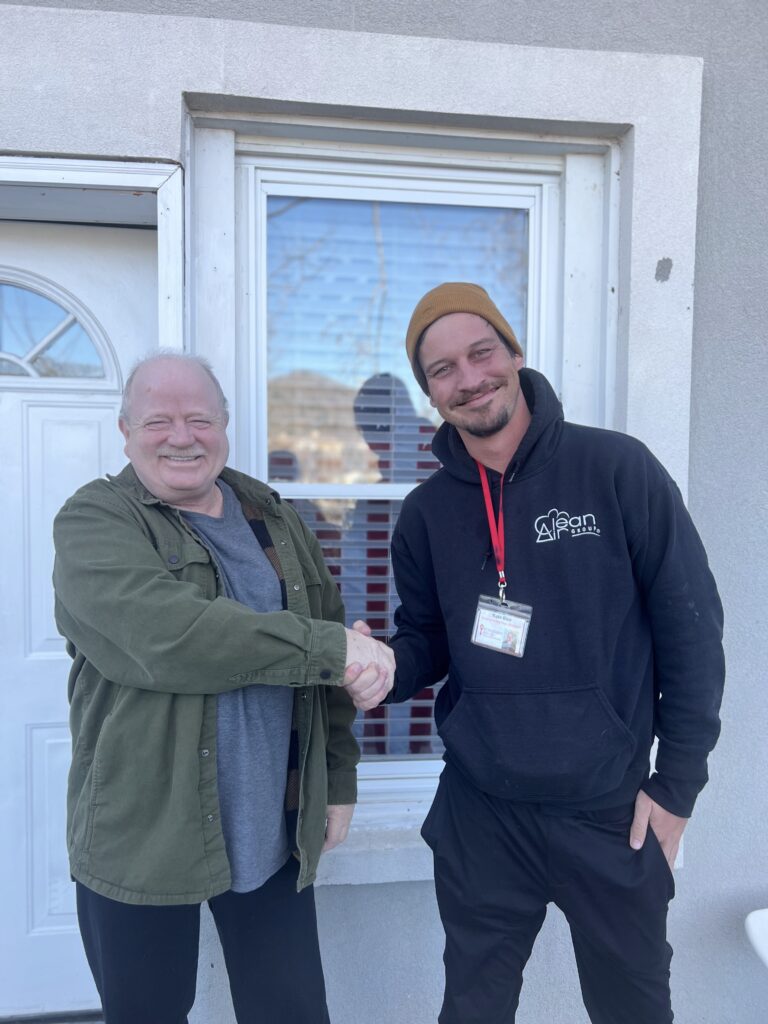“No longer rootless”
We shared Matthew’s story three years ago in September 2022. At the time, Matthew’s life had changed after years of living on the streets and struggling with addiction, health issues, and legal trouble. Matthew felt, and still feels, housing is the best thing you could do for people like him.
One year later, Matthew had to move out of his home because of a disagreement with his previous landlord. Although hesitant and frustrated, Matthew agreed to move to a trailer in Swannanoa once he saw the potential in the backyard space. As a carpenter, antique art dealer, and someone who feels that work makes him a man, Matthew began transforming his trailer into a home for himself.
Even though he struggles with disabilities, Matthew kept a busy life. He says he always had something to do when he woke up. He’d spend time with his neighbors, trim his bushes, pick basil from his garden, and create intricate art from of old junk he’d find. Coming from a construction background in New York, Matthew built a little shop to store tools and work on his projects and hobbies.
Some of his biggest accomplishments included a deck, an outdoor fire pit with a compass, and a water fountain built from an old steel anvil. His final goal was to finish restoring a car and motorcycle, regain his driver’s license, and finally be able to drive himself around again. He’d set money aside to build the life he wanted at every opportunity.
Matthew, who’s now 62, felt proud of how far he had come, and although he says his past made him who he is, he was ready to leave some memories behind.

“I was close to being out of the homeless community, or even mentioning being homeless,” he shared. “I could say I was somebody. I was part of the system. I’m locked in a neighborhood. I’m no longer rootless. Rootless is a big word with me because I’ve been rootless all my life since I left New York.”
Matthew’s Case Manager, Nate, was confident Matthew was on his way toward graduating from Permanent Supportive Housing. Nate encouraged us to schedule a video interview with Matthew, where he could show off how far his life had turned around. Unknowingly, I scheduled to meet with him the same day Hurricane Helene was expected to hit Western North Carolina.
At 7:15, the morning of the storm, Matthew was shocked to see water inside his home and a rescue team arrive outside in a Swift Boat. He told them to get his neighbors first, but they were adamant he needed to leave immediately.
“There I was again with a backpack,” he shared. “I didn’t grab the things I should have grabbed. It took me years to put my life back to where it was 10 years ago. It took 15 minutes to wipe it all away. No matter how hard I do this, no matter what I do, I’m back to a backpack, sleeping on the street.”
Matthew was displaced for two months. After a night staying at the Agricultural Center, Matthew searched for an available hotel room in Asheville so he could be close to his home and doctors, but was repeatedly told all the rooms were booked. He was worried and couldn’t contact anyone. He figured it was better to sleep on the streets for a few nights before going home to see what he could salvage.
“I could tell by the flooring; all the walls were gone; all my artwork is gone.” he shared as he scrolled through photos of his home. “I figured something somewhere would be close by.” The car he was restoring was 500 yards away underneath someone else’s home. His tools were scattered, some taken the next day by looters. Matthew hoped to at least find his Surrealist Angel, a statue from Salvador Dali that’s one out of 500. “Nothing. I couldn’t find anything.”
FEMA gave Matthew $7,500 to cover some losses but denied to reimburse any of his other items including his tools. At that moment, Matthew felt like he had no control over his life, especially when his expenses began to rack up from living in hotel rooms, having to eat out, and replacing things more valuable than their price tag.
“Every time I go into a shop, I think of the movie Joe Versus the Volcano,” he shared. ‘There’s a scene where Tom Hanks goes to shop for clothes and a guy says to him ‘If you don’t know what kind of clothes you want, how can you know what kind of man you are? A man’s clothing describes what he is.’ And for years as a homeless person, my clothes have always been green, black, brown, dark colors, and dark pants with a backpack.”
Matthew was re-housed in November 2024, although he expressed dissatisfaction. It’s a basement apartment, and he doesn’t have the space or a backyard to work on big projects. Losing everything after years of rebuilding has left him unsure about setting future goals. He cares about independence but feels restricted in an increasingly expensive world.
He says, “I’m just a limited man, and I have no control over anything. I have the experience to run [construction project management] jobs, but I don’t have the mindset anymore. I don’t have the patience anymore, and I certainly don’t have the body anymore.”
During our interview, there were glaring moments where Matthew seemed to contradict his self-doubt. His attitude was hopeful as he showed me new artwork he was working on and vintage furniture pieces he was refinishing. He built shelves to hold crystals, rocks, and statues. His walls had new posters and paintings. On his fridge hung a picture of a river ferry, and when asked about it, he said it was a “subliminal” message, manifesting a future where he might one day travel by himself.
When asked what keeps him going, despite everything he’s been through, Matthew says, “It’s because the people at Homeward Bound care about me. They made me realize people care about me. If I give up on myself, then I’ll have let people down I like a lot. Homelessness is a rabbit hole and Homeward Bound is there for a reason. If you get one person out of ten people out of homelessness, you’re a good organization. If you can keep that person out of homelessness, like me, then that’s a good break.”
With the help of his Case Manager and Housing Specialist, Matthew intends to find a new place once his year lease is finished, somewhere with a backyard and enough space for a dog. He still wants to regain his driver’s license. He’s grateful for his stability, but he’s honest about his wishes for the future. If Matthew’s certain about anything, it’s that he’s never wanted to just “exist” or “survive” in life. He wants to live.
